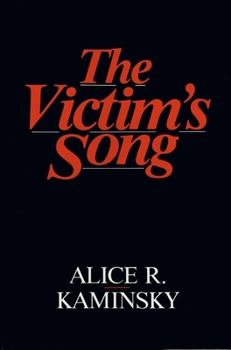The Victim's Song
Select Format
Select Condition 
Book Overview
No Marketing Blurb This description may be from another edition of this product.
Format:Hardcover
Language:English
ISBN:0879752920
ISBN13:9780879752927
Release Date:September 1985
Publisher:Prometheus Books
Length:268 Pages
Weight:1.34 lbs.
Dimensions:1.1" x 6.3" x 9.3"
Customer Reviews
2 ratings
The Sound of Grief
Published by Thriftbooks.com User , 16 years ago
Kaminsky opens with her stated intention of writing at least in part to respond to Mailer's "The Executioner's Song", and I think this is true in more than one respect. Both are frozen -- Mailer in development, Kaminsky in a moment. Mailer writes about crime, violence and retribution from the perspective of an extremely precocious ninth grader obsesesed with Hitler; he's not himself drawn to commit evil, but he is weirdly blank, like a frat kid rapist, in the area where human empathy should be. Kaminsky is not blank there, or anywhere. She's a fully functional adult, capable of work and love and empathy. She is, perhaps, stuck in the anger stage of grief. I'm presuming that because so many people have written, painted, danced, and otherwise portrayed or shared their journey through bereavement and horror, that there is indeed a time when, as Anne Lindbergh said, the bereaved try to follow their dead into the underworld; and a time when many, if not most, return -- permanently changed from the journey -- to this life. I sense that Kaminsky writes from the moment in that underworld in which one can still see the retreating form of the beloved. To imagine 'what if', to see him in the faces and forms of the living, to feel rage against the world, the systems, the ones who did not call, against fate, chance, and life itself -- all this is to keep him in sight. She does not want him to be forgotten; then he is truly gone, vanished from her sight. That will also signal the end of her existence -- or at least of this current existence. She says she is not one of the forgivers, and this is plainly evident. Many factors contribute to what, all alone, would be too much -- the loss of a child: her own personality, the hideous randomness and horror of the crime, the potential Eric possessed. And so she remains in the place where she can survive. And I would say that no one, not even those who have passed through remarkably similar hell, has the right to say she should move on. Grief may be universal, in that we all feel it some day, in some way; but it is also entirely individual, and horribly isolating. You do not know if you will survive it, or in what form you will emerge. I don't think there always has to be a reason to carry on, or that anyone ever really understands the whole process. Death has the power to touch each of us; it will claim each of us even if we don't face it before our own ends. But I do think that its power over the young, though absolute in one sense, fails in another. All children and young people remain, even when they are taken from this life, persistently and eternally about hope, and joy, about survival, about reaching for any chance, about leaping for the sheer happiness of the leap, in defiance of fear and caution.
Articulate, Gripping, and Powerful
Published by Thriftbooks.com User , 26 years ago
In this chilling account of the murder of her son and subsequent trial of the cold blooded killers who took him from her, Alice Kaminsky makes the strongest argument I have seen in favor of capital punishment. If you have ever felt that executing murderers was somehow immoral, you must read this book. As you progress through this sad, sad all-too-real life tale, you will feel a mother's pain and likely lose whatever small sympathy you might have felt for the killers. I read this book years ago, and have recommended it often. Nobody I know of has been disappointed.





